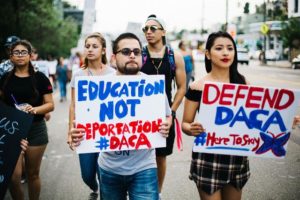
Today the Supreme Court finally agreed to referee a two-year-old dispute between President Trump and Democrats in Congress over the fate of nearly 700,000 undocumented immigrants brought to the United States as children.
The high court showdown, which could be decided in the midst of the 2020 presidential election, will determine whether Trump has the power to end DACA. Although the justices had refused the administration’s request to intervene until now, their decision to hear the case next term signals a potential win for the White House.
Three federal district courts and two appeals courts have blocked Trump from ending the program; only one district court has ruled in his favor. The Justice Department has sought since the beginning of 2018 to make their case at the Supreme Court, which the president said has “treated us very fairly” after turning down the request three times.
The administration first announced its plan to wind down DACA in September 2017, but it was challenged immediately in federal courts from New York to California and blocked nationwide by judges in both of those states. Federal appeals courts in California and Virginia have extended the losing streak.
DACA which was established in 2012 without congressional approval, has protected 670,000 DREAMers from deportation and enabled them to get work permits. Trump originally proposed ending the program in 2017 but gave Congress six months to work out a compromise solution that led to intense negotiations and a brief government shutdown but did not produce a law.
Since then, Trump has suggested that DREAMers fate could be linked to his own dream: a concrete wall or steel barrier along parts of the southern border. His backers have argued that since Obama created the program without Congress, Trump can end it the same way. But nearly all courts have said the administration’s action was “arbitrary and capricious” and would harm both the participants and the state and local governments benefiting from their economic activity.

Recent Comments